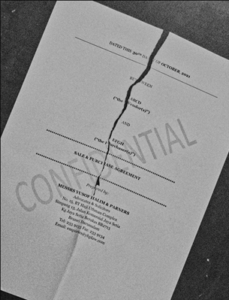Due to the current global coronavirus disease 2019 (COVID-19), many businesses and individuals are finding it increasingly difficult to carry out and perform their contractual obligations in these challenging and unprecedented times. Many are looking at force majeure as either a remedy under existing contracts or to be incorporated into future contracts. In this article, we will take a quick look at what force majeure is, set out the key elements of a force majeure clause and consider its relevance in the face of COVID-19.
OVERVIEW
Under English law, force majeure (French for “superior or greater force”) is a contractual term that stems from an express provision stated in the contract and it is defined in Black’s Law Dictionary as “an event or effect that can be neither anticipated nor controlled. It is a contractual provision allocating the risk of loss if performance becomes impossible or impracticable, especially as a result of an event that the parties could not have anticipated or controlled.” From a contractual viewpoint, a force majeure clause sets out in what circumstances and to what extent parties will be provided a reprieve from performing its obligations under a contract upon occurrence of an event or circumstance that is beyond a party’s reasonable control. Though it may sound similar, force majeure should not be confused with the doctrine of frustration.
KEY ELEMENTS OF A FORCE MAJEURE CLAUSE
In a contract, the parties must agree and define what they will deem as force majeure events. Thus, a typical force majeure clause should spell out specific circumstances or events which would qualify as force majeure events. In general, force majeure events include a list of unexpected or uncommon events, such as civil unrest, war, “acts of God” such a s earthquakes, fires or floods and, sometimes, epidemics. They may, in addition, also set out the criteria for recognising a force majeure event that is not listed.
The force majeure clause should also set out conditions which would have to be fulfilled for such a clause to “kick in” and the effects of the occurrence of a force majeure event . Therefore, in order for a force majeure clause to become applicable (should a force majeure event occur), the affected party would usually have to prove that:
- the occurrence of such events was beyond the control of the party;
- the occurrence of such events was beyond the control of the party;
- they have made reasonable attempts to mitigate the impact or consequence of the said force majeure event.
If an affected party wishes to rely on the force majeure clause, they must issue a formal notice to the other party citing the cause and the invocation of the force majeure clause. The affected party will bear the burden of proof to show that the current circumstances fall within the scope of their contractual force majeure provisions, and that there is a causal link between the force majeure event and its failure to perform i t s contractual obligations.
Depending on how they are worded, force majeure clauses may have a variety of outcomes when relied upon, such as excusing or relieving the affected party from performing the contract in whole or in part, suspending performance, extending time for performance, imposing express requirements in respect of mitigation and/or triggering a right to terminate the contract.

ISSUES TO CONSIDER IN THE CONTEXT OF COVID-19
If the parties have made an express reference in the clause to cover the event that has occurred, then this will be binding on the parties. The word “epidemic” is often included as a force majeure event and a “pandemic,” being a global epidemic, would likely be taken to be within the meaning of “epidemic,” as a force majeure event.
In order for an affected party to rely on a force majeure clause, they will be required to prove that the event or circumstance was beyond the control of the party. Where the clause states that a party is relieved from performance or liability if it is “prevented” from performing its obligations, it is necessary to show physicalorlegal impossibility, and not simply that the contract has become more financially or commercially challenging to perform. If the clause requires a party to show that the event or circumstance “hindered” or “delayed” its performance, then this is a lower bar to prove and may be more relevant. For example, in a supply contract, where fresh produce is sourced from Australia, there may be hiccups due to various parts of Australia being in intermittent periods of lock-down, which may have “hindered” or “delayed” performance so as to engage the force majeure clause. However, in both cases, it is not sufficient to qualify general economic unfeasibility on its own as a valid force majeure event. The economic downturn due to the pandemic will, therefore, likely not be adequate.
The affected party will also need to demonstrate if it has taken all reasonable steps (which may include putting in place quarantine protocols or a business continuity plan or even commercial or financial in nature such as seeking alternative suppliers, hiring extra manpower, injecting additional money etc.) to avoid or mitigate the event and its consequences . The reasonablenes s of the mitigation will, however, depend on a case-to-case basis and the subject matter of the contract.
In a recent Malaysian case, Dato’ Vijay Kumar Natarajan & Anor v Malaysia Airlines Bhd [2021] MLJU 407, the Plaintiff claimed for a refund of an airticket price from the Defendant due to a cancelled flight. The High Court held that the cancelled flight was caused by the movement control order in place at that time and the COVID-19 pandemic which was beyond the Defendant’s control and that the Defendant was allowed to invoke an Article in its General Conditions (found in the Defendant’s website) which states “In the event…your flight is cancelled…due to causes beyond our control such as, but not limited to, force majeure…, we will not be liable to you…”. The High Court further held that COVID-19 pandemic is clearly recognised as an “extraordinary circumstance” and as such reimbursement of the ticket price was not an option. As a result, the Plaintiff’s claim was struck out.
With regard to unilateral power to designate an event “force majeure”, it was held by the UK High Court in an English case that the party with this power must exercise it honestly, in good faith and genuinely, taking into consideration all the relevant factors, failing which it would be a breach of the force majeure clause. In light of the COVID-19 pandemic, the consideration must go beyond the general situation regarding the subject matter of the contract and should include the importance of employee and/ or family welfare, vulnerability and risk of exposure to the virus. Having said that, if a party incorrectly exercises a force majeure clause, that party claiming force majeure relief may expose themselves to a claim for breach of contract if they wrongly stop performance of their contractual obligations or may even put themselves in repudiatory breach of the contract if they have no valid basis for not performing, thereby entitling the other party to terminate the contract and claim damages.
CONCLUSION
The impact of COVID-19 on several industries across the world will be extensive and long drawn-out. In light of this, parties will need to examine the force majeure clauses of their existing and future contracts. Whether or not a party can rely on force majeure will greatly depend on the wording of the clauses and ensure that all the criteria and steps laid out in the clauses (such as actual occurrence of the event, prevention or hindrance (as the case may be) of performance of contractual obligations because of the event, non-performance due to circumstances beyond its reasonable control and that there were no reasonable steps that it could have taken to avoid or mitigate the event) are met or fulfilled. But we must bear in mind that, generally, the economic toll of the pandemic will not qualify as a force majeure event. Nevertheless, the affected party may turn to other remedies, notably the doctrine of frustration.
For more information, kindly contact us at Yusof Halim & Partners.
*The contents of this newsletter are intended to convey general information only and not to provide legal advice or opinion*







